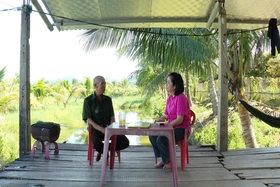{title}
{publish}
{head}
Quang Tri’s coffee industry faces both significant challenges and promising opportunities as it navigates the implementation of the European Union’s Anti-Deforestation Regulation (EUDR).
Experts have said that adhering to the European Union’s Anti-Deforestation Regulation (EUDR) is crucial for boosting Quang Tri coffee’s presence in international markets. This move not only reflects the region’s commitment to forest protection but also strengthens the coffee industry’s value, brand, and role in promoting sustainable economic and environmental development.The EUDR, part of its broader push for green and sustainable growth, mandates that imported agricultural products, including coffee, must not contribute to deforestation or forest degradation. This regulation significantly impacts Vietnam’s key export sectors, particularly coffee, which is one of the most affected.Under the EUDR, all coffee products entering the EU must meet strict requirements, including traceability, proof of legal land use, and evidence that no deforestation is associated with the product. Large enterprises must comply by December 30, 2025, while small and micro-enterprises have an extended deadline of June 30, 2026. Key compliance measures include establishing forest information systems, providing detailed production area data, ensuring legal land use, and offering full traceability to individual farming plots. Additionally, producers must prove that products produced after December 31, 2020, are not linked to deforestation.Nguyen Hong Phuong, Deputy Director of the Quang Tri Department of Agriculture and Rural Development, outlined the key compliance requirements for the EUDR. These include identifying precise farming plot coordinates and providing boundary maps of forest areas for two specific points in time: December 31, 2020, and the date of inspection. Multi-temporal satellite data will be required to assess changes related to forests.
 Experts have said that adhering to the European Union's Anti-Deforestation Regulation (EUDR) is crucial for boosting Quang Tri coffee's presence in international markets. - Photo: L.A
Experts have said that adhering to the European Union's Anti-Deforestation Regulation (EUDR) is crucial for boosting Quang Tri coffee's presence in international markets. - Photo: L.A
Businesses must ensure full traceability of their products down to individual farming plots, covering details such as ownership, yield, production, and product types. Additionally, businesses must separate compliant products from non-compliant ones throughout the entire supply chain.Meeting these requirements presents significant challenges for Quang Tri’s coffee value chain, which involves farmers, processors, cooperatives, and purchasing units. The small-scale nature of coffee farms, combined with limited land documentation and traceability systems, exacerbates the difficulty. Additionally, rising coffee prices over the past two years have increased the risk of farmers expanding plantations into forested areas, highlighting the urgent need for stronger management measures.
Quang Tri currently has around 4,000 hectares of coffee plantations, with 3,600 hectares in production, primarily located in Huong Hoa District. The province produces approximately 4,400 tons of coffee beans annually, averaging 1.2 tons per hectare. More than half of the coffee-growing households are from ethnic minority communities, who benefit from the region’s favorable climate and soil conditions to cultivate high-quality Arabica coffee. Despite its modest production scale, Quang Tri coffee has gained recognition for its exceptional quality. Many local businesses and cooperatives have transitioned to clean, organic, and specialty coffee production, earning certifications such as VietGAP and Rainforest Alliance. Some products have successfully entered international markets, including the U.S. and EU, highlighting the region’s growth potential. On December 23, 2023, the Quang Tri People’s Committee announced a plan to help the local coffee industry adapt to the European Union’s Anti-Deforestation Regulation (EUDR). The initiative includes creating a comprehensive database of coffee plantations, monitoring planting areas, and addressing the risks of forest encroachment. Efforts will also focus on strengthening collaboration between farmers, cooperatives, and purchasing/export companies to ensure product quality. Awareness campaigns and training programs are set to educate stakeholders on EUDR requirements while promoting modern production standards such as organic and VietGAP certifications. To further support compliance, a public-private working group has been established to oversee EUDR implementation across the value chain. Enhanced patrols and community monitoring efforts are being implemented to protect forests, especially in areas with intercropped plantations, in order to minimize risks. The EUDR also presents an opportunity for Quang Tri to transition toward sustainable production. By proactively adapting, Quang Tri’s coffee industry can increase its value, strengthen its international reputation, and solidify its position in global markets. As Nguyen Hong Phuong emphasized, "Proactively adapting to EUDR is not just a challenge, but an opportunity for Quang Tri’s coffee industry to establish its standing on the international stage."
Le An - Tung Lam

QTO - Not letting summer slip by in vain, many students in Quang Tri have taken the initiative to teach English to younger children. Through each lesson,...

QTO - Returning from the northern border front with a 2/4 disability, it seemed his journey of service had come to an end. Yet, this wounded soldier began...